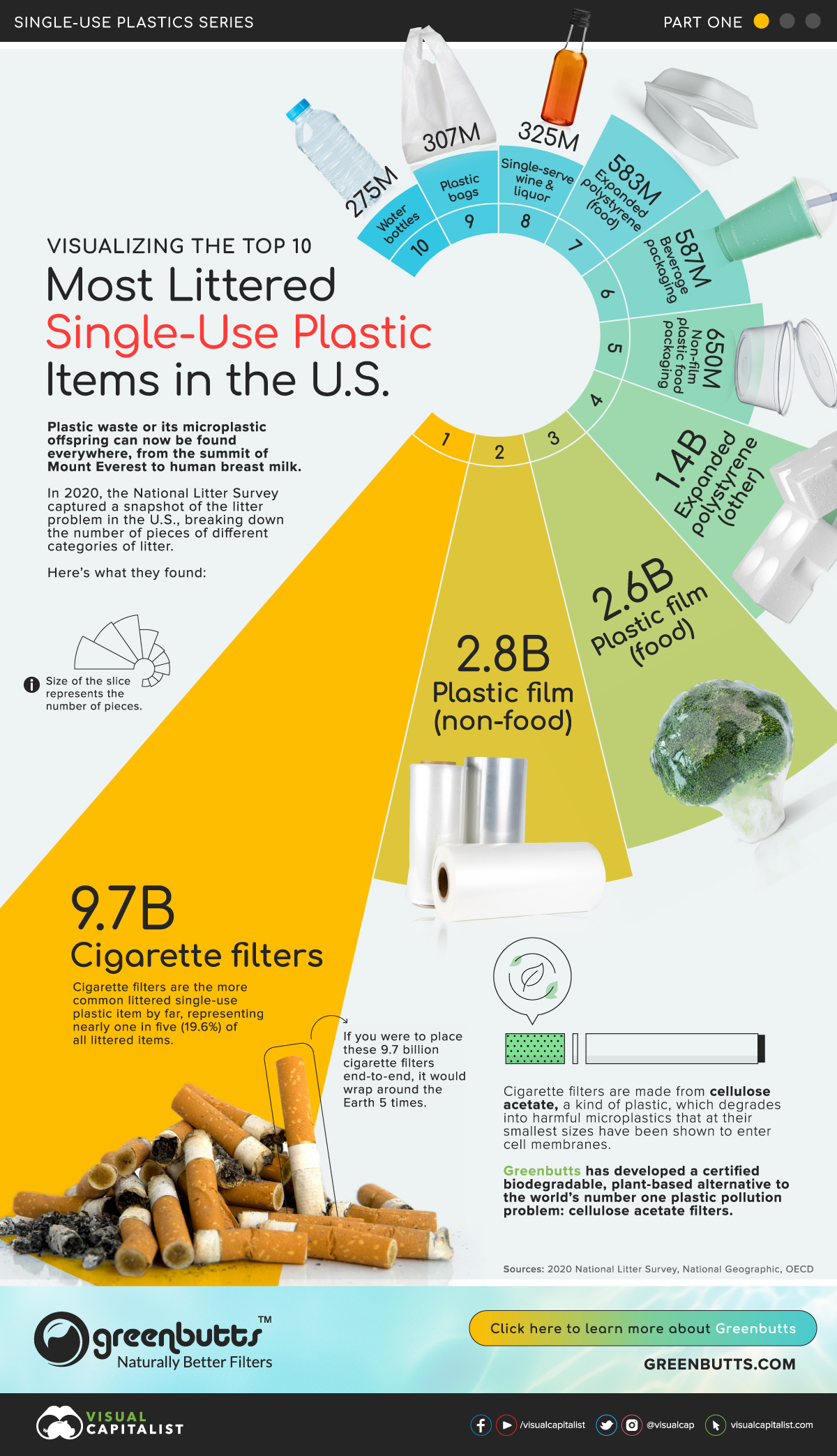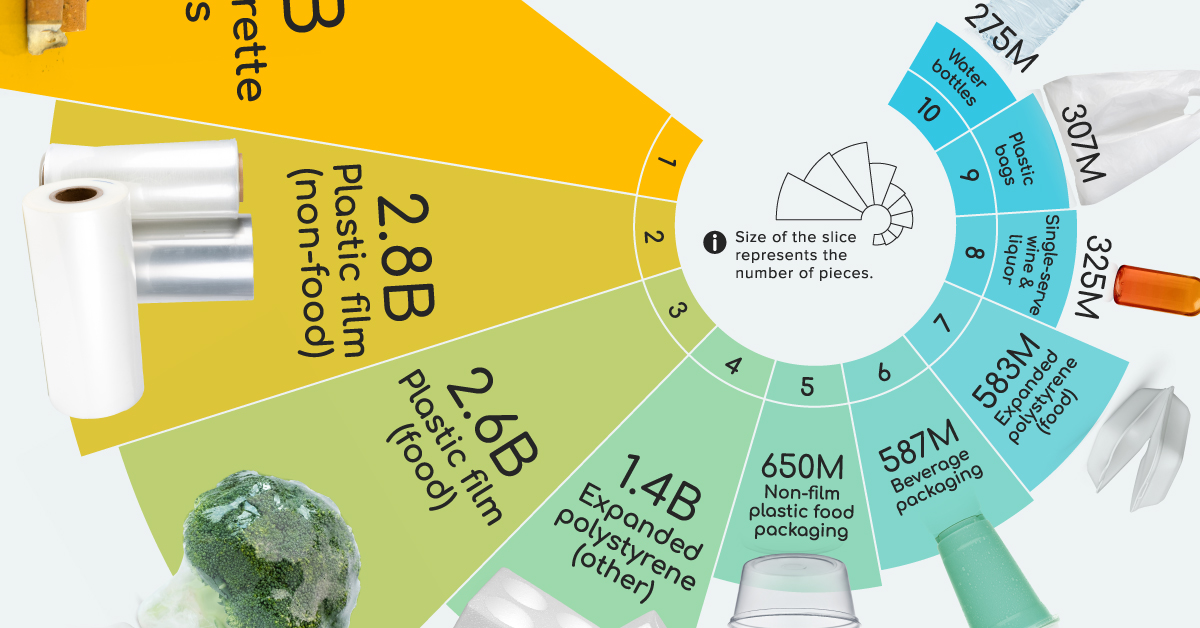Top 10 Most Littered Plastic Items in the U.S.
The Top 10 Most Littered Plastic Items in the U.S.
Hailed as a miracle material when it first appeared, plastic has taken us to the moon, revolutionized medicine, and helped make computers and cellphones possible.
But plastic has a darker side. The world generates over 350 million tons of plastic waste every year, and over one-fifth of that is mismanaged. As a result, plastic waste can now be found everywhere on Earth, from the highest peaks to the deepest seas. There is also evidence that plastics at the nano-scale can cross cell walls.
This visualization from Greenbutts is the first in our Single-Use Plastics Series. It takes data from Keeping America Beautiful’s 2020 National Litter Study and asks the question: what is the most littered single-use plastic item in the U.S.?
2020 National Litter Study
A staggering 9.7 billion cigarette filters make them the single-most littered item in the United States. This is nearly one-fifth (19.6%) of all littered items. If you were to place these cigarette filters end-to-end, they would wrap around the Earth five times.
| Waste type | Number of pieces littered |
|---|---|
| Cigarette filters | 9,697,652,100 |
| Plastic film (non-food) | 2,839,486,700 |
| Plastic film (food) | 2,574,609,700 |
| Expanded polystyrene (non-food) | 1,356,464,400 |
| Non-film plastic food packaging | 649,688,000 |
| Beverage packaging | 587,076,000 |
| Expanded polystyrene (food) | 583,235,600 |
| Single-serve wine & liquor | 325,476,500 |
| Plastic bags | 307,365,600 |
| Water bottles | 275,372,600 |
Considering that 240.9 billion cigarettes were sold in the U.S. in 2022, and that more than 80% of cigarette filters are littered, it is possible that this figure is actually conservative and likely only a small fraction of the true number.
These findings are in line with other international studies. Cigarette filters are routinely the number one most-collected items during the Ocean Conservancy’s annual International Coastal Cleanup.
Food and beverage containers of various kinds were also a key source of plastic litter, representing half of the top 10. Interestingly, plastic bags were only number nine, perhaps because of the success of bans at the state and local level.
Cigarette Filters Are Not Biodegradable
There is a common misconception that cigarette filters are biodegradable. Biodegradation is the breakdown of organic matter by microorganisms, and despite their almost cotton-like appearance, cigarette filters are actually made from a kind of plastic called cellulose acetate.
Plastics degrade in the environment, often through exposure from the sun’s UV rays, breaking down into smaller and smaller pieces. But ultimately, plastic gets into the food we eat, and even the air we breathe.
Cigarette filters can take years to degrade, from 18 months to 10 years according to research, causing significant harm to the environment in the process.
Tackling the World’s Number One Plastic Pollution Problem
Greenbutts has developed a certified biodegradable, plant-based alternative to the world’s number one plastic pollution problem, cigarette filters.
This is the first piece in our three-part Single-Use Plastics Series from Greenbutts. Next up is an exploration of the impact of plastic cigarette filters on the marine environment.
>> Learn more about Greenbutts.

-
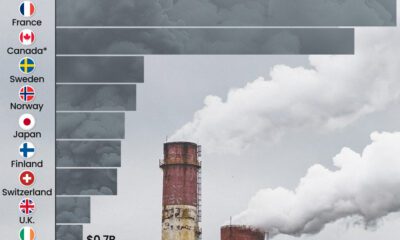
 Green7 days ago
Green7 days agoRanking the Top 15 Countries by Carbon Tax Revenue
This graphic highlights France and Canada as the global leaders when it comes to generating carbon tax revenue.
-
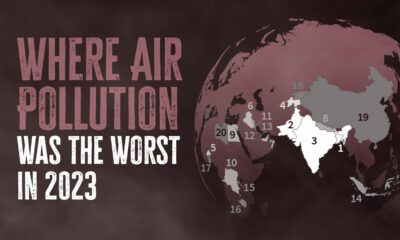
 Green1 week ago
Green1 week agoRanked: The Countries With the Most Air Pollution in 2023
South Asian nations are the global hotspot for pollution. In this graphic, we rank the world’s most polluted countries according to IQAir.
-

 Environment1 week ago
Environment1 week agoTop Countries By Forest Growth Since 2001
One country is taking reforestation very seriously, registering more than 400,000 square km of forest growth in two decades.
-

 Green2 weeks ago
Green2 weeks agoRanked: Top Countries by Total Forest Loss Since 2001
The country with the most forest loss since 2001 lost as much forest cover as the next four countries combined.
-

 Markets2 months ago
Markets2 months agoThe World’s Top Cocoa Producing Countries
Here are the largest cocoa producing countries globally—from Côte d’Ivoire to Brazil—as cocoa prices hit record highs.
-
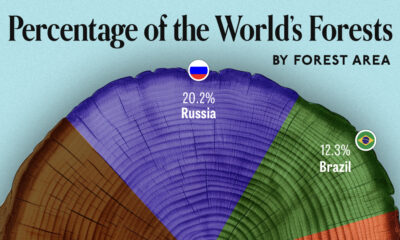
 Environment2 months ago
Environment2 months agoCharted: Share of World Forests by Country
We visualize which countries have the biggest share of world forests by area—and while country size plays a factor, so too, does the environment.




